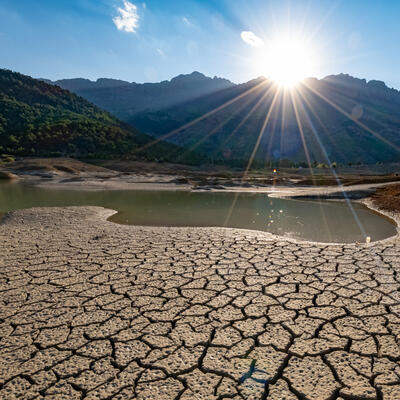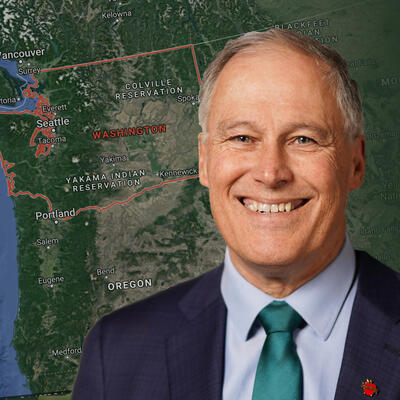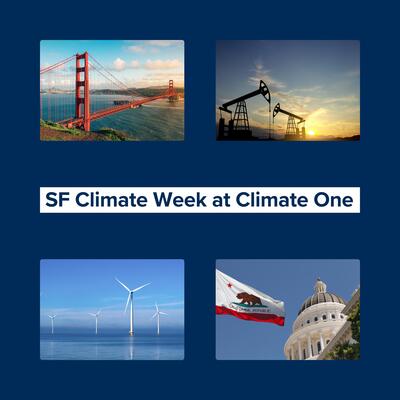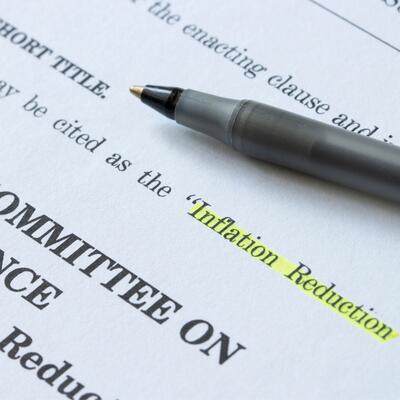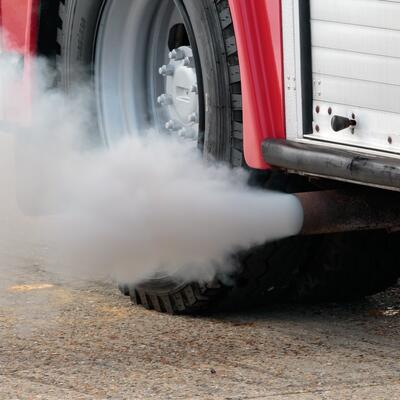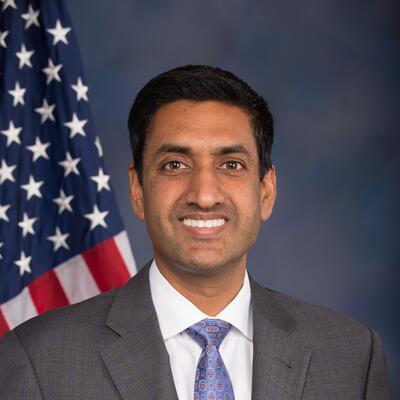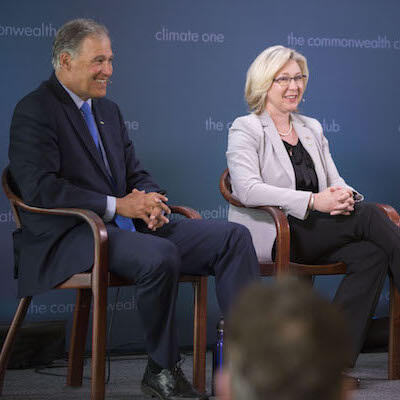
Can the Pacific Coast Lead the Transition to a Clean Economy?
Guests
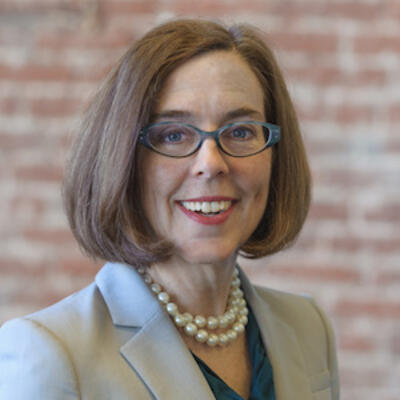
Kate Brown
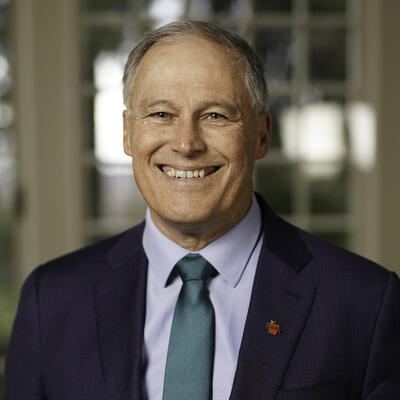
Jay Inslee
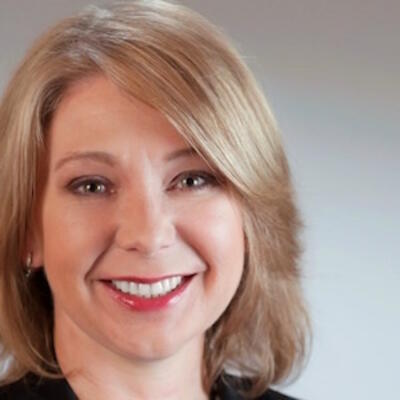
Mary Polak
Summary
The Pacific states and British Columbia have all pledged to reduce carbon emissions. Can they help accelerate the global transition to a green economy?
Kate Brown, Governor, Oregon
Jay Inslee, Governor, Washington
Mary Polak, Minister of Environment, Legislative Assembly of British Columbia
This program was recorded in front of a live audience at the Commonwealth Club of California on June 1, 2016.
Full Transcript
Greg Dalton: From the Commonwealth Club of California, this is Climate One changing the conversation about America's energy, economy and environment. I’m Greg Dalton. One of the main arguments against switching to cleaner energy is that it will hurt your pocketbook or the economy overall. But the cost of solar power is dropping quickly and in many parts of the country sun power is competitive with fossil fuels. What about jobs? Last year jobs in the American solar industry surpassed employment in oil and gas extraction for the first time. That means more Americans work tapping the sun than oil and gas under our feet. Worldwide more than 8 million people have clean energy jobs, according to the International Renewable Energy Agency. That's an industry group based in, get this, Abu Dhabi. On the show today we will travel the West Coast of North America, home to some of the greenest economies in the world. We’ll learn what they are doing to create jobs while moving away from extraction industries toward cleaner businesses.
We’re pleased to welcome with us three distinguished guests. Kate Brown is governor of Oregon, a Democrat. She previously was the Secretary of State and served 17 years in the state legislature where she was the first woman to be Senate Majority Leader. Jay Inslee is governor of Washington. He was a Democratic member of Congress for 15 years and served in the Clinton administration as Regional Director of the U.S. Department of Health and Human Services. Mary Polak is Minister of the Environment in British Columbia. She's been a member of the provincial legislature since 2005 and previously served as Minister of Transportation and Infrastructure. Please welcome them to Climate One.
[Applause]
Thank you all for coming. Governor Inslee, when people think about climate change it’s often very abstract but Washington is an agricultural state. You recently signed a deal with some other West Coast states California, Washington cities to get at food and food waste. So tell us how food and agriculture is a climate issue, something people can relate to.
Jay Inslee: Yeah, well this is not an abstract. When you’re a governor of a Western state that is being assaulted by climate change, that is damaging people you know, this is not an abstraction. This is not a graph. This is not a parts per million issue. This is looking at a family that lost their home in a forest fire last year. And I remember seeing a lady in Wenatchee, Washington standing in front of -- you know, remains of her home and she said “Where is my house?” You know, where is my house. And that sense of shock that she had, that sense of emotion was the face of climate change.
And we governors are seeing it in the West Coast right now. We had forest fires larger than burn an area larger than the state of Delaware and the state of Washington last year. I had a talk to oyster growers who had to move their operations because of ocean acidification has made it impossible to breed some of the larvae. And we get farmers that worry about their water supplies because we had a good snowpack this year but guess what, it’s all melting off within two or three weeks so we’ve got no irrigation. Now we could double our wine production in the state of Washington but you can’t do it if you don’t have water.
So when I think of climate change I think of the faces that I've seen of people whose lives are being threatened by this emergency, this emerging problem. So this is personal it's real, it's here and it demands an urgent response. And, you know, if I can just give you my thoughts of this, we got to do two things. We got to come at this with a fighting spirit and that's what you got to have, this is a fight. Somebody is coming in our house and they’re wrecking our house, number one. And number two, we got to have a sense of confidence that we can win this and we have a sense of confidence in our state because we build jet airliners, we build great software and we know we’re building some of the best clean energy technology so you bet, this is real.
Greg Dalton: Governor Brown, Governor Inslee just said someone is coming into our house but we created this mess. So how do we deal with something that we’ve created and do it so quickly?
Kate Brown: Well, we’re focused in Oregon in a number of areas but primarily around coal and cars because those are the two primary producers of greenhouse gas emissions in Oregon.
And so we tackled cars by passing our low carbon fuel standard last year which I signed into law. And then we tackled coal over a period of time. 1997, we said we’re not gonna build any more coal powered electricity generating plants in Oregon. And in a few years ago we agreed to shut down our only coal powered electricity plant at Boardman; that will be shut down by 2020. And then most recently I signed into law a bill that will move Oregon away from coal generated electricity. We are the first state in the nation to do that. That bill also required that we move to 50% renewables by 2040. So I'm very proud. Oregon is not a huge part of the global problem we’re a small state we only have 4 million people. But we can be part of the solution and that's exactly what we’re doing.
Greg Dalton: Minister Polak, in some ways British Columbia was out ahead of even California and Washington and Oregon in terms of putting a price on carbon pollution. And so far I don’t think it's trashed your economy, BC is still doing pretty well. Tell us how that worked out.
Mary Polak: Well, the short answer is our experience with having a revenue neutral carbon tax is emissions are down and the economy is up. We have an economy in British Columbia that has been outperforming the rest of Canada, even through the 2008, 2009 downturn. That was by the way when we brought in our carbon tax. You might think we're crazy for doing that, instituting a new tax when you have an economic downturn. But the evidence now is pretty overwhelming that it not only dropped our petroleum consumption across all fuel types, but we believe it actually strengthen our economy.
Every dollar of our carbon tax is returned to British Columbians in either direct tax reductions or in the case of low income people, direct rebate checks to them. So you’re constantly recirculating these dollars back into the economy, giving people the ability to make their own choices. And because it is so broad it impacts on everyday people's behavior. We all know that there are industries we need to tackle. We know that there are power grids we need to tackle, all sorts of the big things that governments can get a hold of. But if you really want those deep emissions reductions, you have to do things that are going to change the market for electricity for clean electricity and you have to do things that are going to change the behaviors of everyday people that live in your communities.
Greg Dalton: Lot of the time that British Columbia was doing that there was a national government in Canada, the Harper Government that left the Kyoto protocol that was very pro-fossil fuels and hostile to climate action. So how did BC move forward when the national conversation was very different and then we’ll get to the United States, which may be heading down that path.
[Laughter]
Mary Polak: It was very difficult. We now are joined by some fantastic partners in the world of carbon pricing in provinces like Ontario, Quebec, Alberta. They've all now, they’re some ways down the pathway of having a price on carbon. They’re still not as broad or as high as ours, ours is about $30 Canadian a ton that would equate to about $.20 U.S. on a gallon of gas for example. But I'll tell you, the most exciting thing for me about COP21 in Paris was seeing the Prime Minister and the premiers walk in and people reacting with, great Canada's back. For us now we have our federal government leading the development of a pan- Canadian framework and thankfully, thankfully one of the working groups they have preparing materials for the prime minister and the premiers is a working group working on a national carbon price and what that might look like.
So for British Columbia, we’re finally seeing a federal government that really wants to partner on climate action. And that's gonna really do us proud in Canada, but it's also gonna make it possible for provinces like British Columbia to continue to advance.
Greg Dalton: Governor Inslee, you served in Congress 15 years. It’s a very different situation, United States and Washington where climate is basically highly politicized there’s a presidential candidate who would says he would revoke, cancel the Paris climate deal. So how can states and cities move forward when it’s kind of a toxic debate at the national level?
Jay Inslee: Yeah, it still, you know, it’s still surprising to me. I mean if you're at the top of the Trump tower you can see the curvature of the earth.
[Laughter]
But we have a presidential candidate who belongs to the flat earth society so I don't understand what the difficulty is here. We’re moving forward in Washington State. And the people of Washington State want us to respond to this challenge. And they understand, and the reason is they understand the health of their children are at risk, not just the polar bears. I remember meeting a young woman named Jasmine Carlin, she's 14 years old. She was studying asthma in relationship to proximity to roads and industrial sites. She told me that she was 14 before she understood there were some kids that didn't have asthma, it's that profound. So we have a population that wants the Democratic system to really tackle this problem and we are doing it. So we have a renewable portfolio standard; we have some of the best efficiency standards top three in the United States. We have a program that helps people get affordable electric cars. We have a program that builds electric infrastructure. We have a system that has helped to integrate a grid scale storage so we can integrate renewable resources in our grid.
And as of this morning, I’m kind of excited about this because we had a big development in the state of Washington this morning. We rolled out our first proposal to actually provide Washingtonians a cap on the amount of carbon pollution that’s coming out of our largest emitters, those who emit over a hundred thousand tons of carbon a year. And this is gonna be through our Department of Ecology, it’ll be an enforceable cap. We will give our grandchildren what they deserve, which is a protection against massive amounts of carbon pollution and that's done under our existing clean-air law.
So the reason we are moving forward is with a population that want action we have an executive who's willing to implement the statutory things that are already in the book. We have clean-air laws put in place in 2008, but the legislature never implemented it. So essentially the executive branch now is adopting the rules that will do this and as a result of all these things that we've done, we will have a grid in the next four years that is 90% free of fossil fuels. And we are also tackling transportation fuel. So we will have the first executive action that will put a cap on the amount of carbon coming out of our transportation sector as well. So I guess the answer to your question is we’re moving in the state of Washington. we’re making progress. We’re confident in our ability to do this because look, that’s what we do we create, we innovate, we build. We made the first successful commercial airline. We invented the artificial kidney machine and now we’re doing clean energy, so things are happening.
Greg Dalton: And you’re going around a hostile legislature and similar to what President Obama is doing because you can’t get rings through there.
Jay Inslee: It is true, but I wouldn’t say going around we’re simply implementing the legislation that was adopted but never implemented by the legislature itself. And it’s entirely consistent with our existing clean-air responsibilities. And I emphasize this is about clean-air it is not just about climate, it’s about clean-air that our kids breathe. And when you talk to people about it in those terms they want clean air.
Greg Dalton: Governor Brown, it’s often seemed to be a trade-off between jobs and going green. So can Oregon and other places grow their economy while also getting cleaner, does that come at the expense of I don’t know, loggers or other people in your state?
Kate Brown: Well, I think you're looking at multiple states and province that are doing very well economically. Bloomberg just ranked Oregon as the fastest growing economy in the United States. I know Governor Inslee may disagree with that ranking but we’re doing well. And our green clean technology jobs are part of that, they're growing at a rate of 11% substantially faster than other sectors. The key is innovation and Oregon has seen fit to invest in innovative practices that will ensure that the economy thrives and that our environment is cleaner. And I think we can do both and I think this West Coast collaborative is a great example of that.
Greg Dalton: Income inequality is a big issue in American politics. There’s concerned that some people will get left behind in the transition to a green economy, whether it's former loggers, former miners, Governor Brown, what are you doing in Oregon to make sure people aren't left behind?
Kate Brown: So let me talk about our timber dependent rule economy. So Oregon has invested in a product called cross laminated timber. I like to describe it as plywood on steroids. These are sustainably harvested logs coming off of our forest, our rural forests that are then used to build beautiful more sustainable buildings. It’s technology used in Europe, it's very successful. Oregon has the first CLT, cross laminated timber manufacturing facility in the United States. I believe this is a win win, win. It's a win for our local rural timber dependent economies. It's a win for the earth in terms of we are building more sustainable buildings, and I believe it's a win for healthy forests.
So it's the triple win, I'm very excited about our investment in this particular technology. But there's certainly more that we can do and the legislature, I can't take credit for this one, invested in BEST, which is an incubator. It supports green technology and the commercialization of new technologies that will help us tackle some of the issues that we've talked about. So there are multiple approaches. The third approach we passed a couple of years ago a public purpose charge that supports and helps low income families with weatherization practices on their homes or in their apartments that will reduce their energy costs. So we’re tackling it at multiple different levels.
Greg Dalton: Kate Brown is the Governor of Oregon. If you’re just joining us, we’re talking about the green West Coast economies at Climate One. I'm Greg Dalton. My other guests are Mary Polak, Minister of the Environment of British Columbia and Jay Inslee, Governor of Washington.
Mary Polak, there’s a lot of fossil fuels and the internal interior of North America that wants to get out to market in Asia. The American coal industry is basically dying, companies are declaring bankruptcy. There is a port proposed liquid natural gas port in British Columbia and some climate scientists recently wrote to the government of Canada saying please don't do this, $36 billion investment in liquefied natural gas. And you wrote back and said they're not connected to reality. So tell us about --
Mary Polak: Well let's talk about what it was they were basing their conclusions on. Science is only as good as the assumptions that you put into your analysis. And in this case, in all fairness to the scientists their assumptions were based on the unmitigated emissions from that plant. So they were basing their conclusions on a profile that would've seen this plant become the single largest emitter in all of Canada.
However, there are many things you can do to reduce emissions in terms of a liquefied natural gas project not just at the plant level but also in the upstream and in production. And we now have put in place a benchmark for intensity of CO2 in production that will have those be at the lowest rate of any other production facility in the world. Upstream with the proposals we have for methane reduction as well as the proposals for electrification of the processes, instead of being at around 18 megatons annually in emissions. You would drop the emissions from that plant and its upstream to about 3.7 so significant, significant drop. And when you consider that our export markets are those where the LNG that they would receive would avoid the use of thermal coal in generation of electricity, you're talking about potentially even on a lifecycle basis a reduction in those areas of about 20% of their GHG emissions if they were instead of coal to use LNG. So really there is a global solution to be had and one of the biggest challenges we have globally is the capacity for jurisdictions to transition to cleaner fuels and the time it's gonna take to do that. You don't want them languishing on coal and diesel. Natural gas used in the right circumstances can have a significant impact in cleaning up not just emissions but also course particulate matter and other things that concern us around the health of populations in places like Beijing and other areas of the world where there are people who are dying because they don't have clean-air.
Greg Dalton: Governor Inslee, do you agree that natural gas is a transition fuel even though it’s a fossil fuel and that it should be part of the transition to a cleaner economy? Do you support natural gas and liquefied natural gas?
Jay Inslee: I don't think there’s a black-and-white answer to this. We know we have to wean ourselves off of fossil fuels it’s an absolute necessity if we’re going to have any chance to have a meaningful climate on the face of the earth. We know we have to get there. And so you have to look at these almost on a case-by-case basis to see if they make sense as some kind of transitional thing. I do think that we have to be very cautious on natural gas and the methane emissions associated with their production. And I think we have more work to do to be confident in what our assumptions are about methane releases in the drilling and transportation. I don't have full confidence yet that we really know that issue. We got to understand that before we do consider a transitional fuel is the way I would look at it.
Greg Dalton: We had Lou Allstadt, former Executive Vice President of Exxon Mobil here recently. And he agreed that the industry does not have a handle on methane emissions and that's the Exxon Mobil Executive. Governor Brown, $6 billion natural gas plant, the developers pulled the plug in Columbia River basin. So how do you see natural gas; is it part of the transition, a lot of people who are against fracking think that the natural gas could be worse than coal in some cases.
Kate Brown: Well, Governor Inslee said it very well. It's certainly a gray area we need more data; in terms of the global issue it has to be part of the solution.
Greg Dalton: Governor Inslee, coal ports there's a lot of them propose along the West Coast. A lot of American coal looking to Asia as a lifeline. Some of them have been rejected. Some of them have been pulled, where does that stand and do you support building coal ports which could develop jobs in Seattle and the port areas of Washington?
Jay Inslee: Well, the first thing we support is eliminating our dependence on coal in our grid which we are doing. So we’re shutting down our own coal plant in a few years. We just have legislation this year that will allow us to shutter two plants in Montana that are feeding us coal-based electricity. We want to have a state free from coal, we’re moving in that direction.
On the coal port issue, one of the things -- and I have to be somewhat judicious how I talk about it because I’m a permitting authority, so I can't give a black-and-white answer on this subject by law. But what I can say is that in our environmental protection system of permitting, we are insisting on evaluating the carbon emissions of the coal wherever it is burned. So even though if the coal is not burned from the shipping point it doesn't matter where it's burned. The carbon dioxide from that coal ends up in my waters in Puget Sound because we have a global essentially partial pressure system that puts carbon into solution and acidifies our water. So as part of our local permitting process we are insisting on the applicants to assess what the carbon pollution, global or actually local ramifications are produce of burning that coal and some of the proponents don't like that but I think it’s the fair thing. Because frankly, it doesn’t matter where you burn it, it ends up in my backyard and in Puget Sound, which makes it difficult to grow oysters. So we are having that assessment, we have one plant right now that’s still under consideration as part of our environmental protection, as part of our environmental impact statement; we’re getting those results.
Greg Dalton: We’re talking about green West Coast economies. That was Jay Inslee, Governor of Washington. We also have Kate Brown, Governor of Oregon and Mary Polak, Minister of the Environment from British Columbia. I'm Greg Dalton. I’d like to go to our lightning round right now. We’ll ask each of you a yes or no question starting with Mary Polak. Yes or no, Canada is considering building a wall to keep out undocumented Americans fleeing North after the upcoming presidential election --
[Laughter]
Yes or no?
Mary Polak: That’d be no.
[Laugh]
We want people to come and work in Canada. We need people.
Greg Dalton: Governor Inslee, Washington is the second largest wine producer in the country after California. During your trip to California you are secretly going to Napa Valley wineries and encouraging them to move to your state as temperatures become too hot for some varietals in California wine growing regions, yes or no?
Jay Inslee: Well you're on to me but I’ll tell you what’s happening.
[Laughter]
This is a serious issue. Napa Valley is moving to Washington because the climatic conditions that exist --
Kate Brown: Can I interrupt?
Greg Dalton: Yeah.
[Laughter]
Kate Brown: Napa Valley is moving to Oregon. That is really clear.
[Laughter]
Greg Dalton: Through Oregon and then on up to. Governor Brown, traffic in Seattle is worse than traffic in Portland, yes or no?
Kate Brown: Yes.
[Laughter]
Greg Dalton: That is because Portland has invested in an extensive light rail system.
Kate Brown: We were blessed by early leadership, folks like Congressman Earl Blumenauer and Governor Barbara Roberts worked really hard to partner with the federal government to both have the vision for light rail and get it implemented.
Greg Dalton: Governor Inslee, Seattle should've invested more in its scrawny light rail system and managed it better?
Jay Inslee: You betcha. I will point out that we just passed -- this is actually a matter of some pride -- we passed the not only the largest transportation package in our state’s history but the greenest transportation package with the heaviest percentage attributable to light rail. We’re going to build a light rail system we hope from Everett to Tacoma. Bike lanes, HOV, rapid transit bus. And we’re proud of that achievement because your transportation policy is just about as important as anything else you do. And when it comes to the world of carbon and I think that’s easy to forget any infrastructure that we invest in today has a carbon footprint. And we’ve been diligent in making sure that we think about that when we make our infrastructure improvements.
Greg Dalton: Mary Polak, Vancouver, British Columbia is adequately prepared for sea level rise that will occur in your lifetime, yes or no?
Mary Polak: No. Absolutely not. And it's one of the things I think that motivates Vancouver to be so aggressively pursuing their climate action agenda inside our province.
Greg Dalton: Governor Inslee, the $3 billion tunnel being bored under downtown Seattle to ease traffic congestion is adequately protected from rising seas that could flood it and make it a very expensive slip and slide?
[Laughter]
Jay Inslee: I’ll have to say yes just so we can maintain our confidence.
[Laughter]
Greg Dalton: Governor Brown, U.S. rejection of the Keystone XL pipeline shifted transport of Canadian tar sands oils to rail cars that pass through many American communities?
Kate Brown: Probably yes. So I want to go back to another important point that Governor Inslee raised and that is our transportation infrastructure. Oregon led the nation many years ago with our land-use planning system. And that has been a very wonderful tool for keeping our urban communities intact and helping us build transportation infrastructure. And I just think that that is a tool that we don't always think of when we're talking about global climate change. Because having compact cities enables us to develop a transportation infrastructure that enables people to get to places very easily. And you can do it in a way that promotes health as well through walking and biking. And so I just want to put that on the radar screen.
Greg Dalton: Governor Inslee, under President Obama, domestic production of fossil fuels has soared, yes or no?
Jay Inslee: There has been clearly an increase and there’s a certain irony. But having said that, I want to tell you I'm so glad that President Obama has been the president the last eight years. His leadership on this has been tremendous --
[Applause]
-- and he has stood up against enormous, you know, flat earth society members in the U.S. Congress that are dominant in one of those chambers. And his active leadership is going to succeed I believe, so thank him.
Greg Dalton: Governor Brown, who will win the Oregon, Washington border battle this year between the Oregon Ducks football team and the Washington Huskies?
Kate Brown: I’m confident that our award-winning Ducks will be successful.
[Laughter]
Greg Dalton: Governor Inslee, who will win the Oregon, Washington border battle this year between Oregon Ducks football team and the Washington Huskies?
Jay Inslee: Well it’ll be the Huskies and they’ll be using our good bike lanes and bus to get home.
[Laughter]
Greg Dalton: Mary Polak, as a Canuck do you even know what is an Oregon duck?
[Laughter]
Mary Polak: I’m guessing it doesn’t quack.
Greg Dalton: Okay. Alright, that ends our lighting round. Let’s give them a round of applause. Thanks for them.
Kate Brown: Thanks you guys, that was fun.
[Applause]
Greg Dalton: Governor Inslee, you're up for reelection in November facing a Republican, Bill Bryant, who criticizes you for traffic jams in Washington. So how can you get green mobility, address traffic jams in Washington while also having greener lower carbon mobility?
Jay Inslee: Well we have a really beautiful thing here, which is you can increase mobility and reduce carbon pollution at the same time. They are not enemies; they are mutually tied at the hip. Because we are not building any more dirt in the state of Washington, we have a fixed finite landmass. And we have to increase the carrying capacity of all of our corridors to stop the strangulation of traffic. So for every mile of corridor we have to increase the carrying capacity of that so more people can use that carrying capacity per hour. Okay, we know that it’s from a rule of physics. Well, by doing that you reduce, almost anything you do to do that reduces carbon pollution per mile traveled per person and it gets you where you’re gonna go faster. So when you provide bus transit for people, first off, they love it. Every bus we put on its full the next morning because people love the service they’re getting. We have a new system of providing lanes that have decreased the travel time on buses.
We put our light rail system a new station that's right in front of the University of Washington football stadium where you can see the Huskies beat the Ducks next year. We have had, we got a ridership that like doubled our projections. So the word is that people love public transport they use it at the same time we’re reducing carbon pollution. So they’re very compatible.
Greg Dalton: California Governor Jerry Brown is infatuated with high-speed rail, very expensive, Governor Inslee, do you think that that's a solution for the West Coast as urban corridors get more dense.
Jay Inslee: I mean that’s possible but right now in our generation, we’re focused on this light rail in the Seattle Tacoma Everett corridor. And we will have initially on the ballot this year as part of a translation bill we made that possible. And let’s not forget the job aspect of this work we’re doing as well. Our transportation bill is going to put 200,000 people work with family wage jobs and I think that’s a pretty good thing. So we’re focusing on the light rail first.
Greg Dalton: Governor Brown, there's a company in Oregon, NuScale which is a new nuclear company, received $200 million from the U.S. Department of Energy. It's a next-generation nuclear company. Do you see nuclear as being part of the climate solution put forward by the Paris agreement?
Kate Brown: I'm not sure that the data is there to confirm the level of safety around storage. And until we have the data and proof around safety, I'm not there yet either.
Greg Dalton: Governor Inslee, Hanford is the most contaminated nuclear site in the country, biggest environmental site in the country the big economic debacle in Washington with nuclear power. Where are you on nuclear?
Jay Inslee: Well, I think two things are going to happen before nuclear becomes an important part of the future. One, we need new technologies so that it becomes price competitive. That certainly does not exist right now. The reason the nuclear industry essentially ended was not because of Jane Fonda, it’s just basically the cost was extraordinary to build these multiple billion-dollar plants with huge risk associated with them.
So there will have to be a breakthrough technology to make them cost competitive and safer. But the second thing is we have to have a storage system that we have the confidence in, and we don't have that right now. We don't have the prospects on it. Yucca Mountain was a potential and as you know that's on the shelf at the moment. I do support research into both of these things though. I think it's important given the level of crisis, and it is an urgent crisis our carbon pollution. I do believe it is appropriate to be doing R&D to see if we can reach safe systems with small modular reactors and research to see if there can be a long-term disposal system. I think those are rational decisions right now.
Greg Dalton: Mary Polak, Rachel Notley was elected premier of neighboring province Alberta, which is the Texas of Canada. That's kind of, she's a very progressive person, that’s kind of like Jerry Brown being elected governor of Texas. So tell us how that has affected the politics around energy and politics in general in Western Canada because that was quite a seismic shift.
Mary Polak: So first let’s all agree that nobody's like Governor Jerry Brown. It has really -- the conversation across Canada has changed dramatically in the last year or so. But particularly in Alberta, where there was always massive resistance to taking action on climate and that around carbon pricing in particular. Now we see Alberta announcing that they will have a carbon price that will begin at $20 a ton next year, will go to $30 a ton by 2018. It's not quite as broad as British Columbia's but we'll take it because being out in front as we have been has been tremendously challenging for our businesses.
One of the difficult challenges for jurisdiction, subnational jurisdictions I think, in particular, is that you can drive really hard down the climate action path. If you go too far, too fast you simply cause industries to move to another jurisdiction where they can continue to emit and do so more cheaply. So you have to find that right balance in terms of putting the pressure on through carbon pricing, but not putting the pressure onto such an extent that you then see that industry moved to another jurisdiction, and simply emit elsewhere. So with partners now like Alberta and then of course the pricing we’re seeing through cap and trade in Ontario and Québec, national carbon pricing being discussed by the Prime Minister, I'm very hopeful that you’re going to see increasing progress on carbon pricing in Canada. It's interesting in the way the politics has shifted though, you now have first of all the female premieres in Canada, yes go women, are the ones who are advocating that the federal government be more directly involved in addressing climate in our country. So that has been a real shift and it's one we think is very positive for British Columbia.
Greg Dalton: Jay Inslee, sure.
Jay Inslee: Can I piggyback on this issue of carbon pricing. We have a carbon pricing initiative on our ballot this fall that would establish a carbon tax essentially. And it's unlikely to succeed because although it was billed originally as being revenue neutral, it in fact, according to the analysis reduces state revenues by several hundred million dollars because of some drafting issues. And this is of concern to a lot of people, including myself, because this would take money out of our school funds. And the reason I mention this is that I think it is likely this will not prevail and I do believe it will not be a negative comment to the extent to somehow suggest that Washington doesn’t care about climate change.
I think if it does not pass, it will just say that Washingtonians care about school budgets and don't want to reduce hundreds of million dollars in school budgets. And I say that because I think it's an important message, we’re going to move forward we hope over time on issues like this, but it won’t be this fall.
Greg Dalton: We’re talking about clean energy at Climate One. Our guests today are Kate Brown, Governor of Oregon. Jay Inslee, is Governor of Washington and Mary Polak, is Minister of the Environment in British Columbia. I’m Greg Dalton.
Let's go to our audience questions at Climate One. Welcome.
Male Participant: Thank you. Governor Inslee, I understand that small hydro plants could be the answer especially for Western Washington. Not the big plants that need big dense, but the small localized hydroelectric projects. Could you comment on that on the future of hydroelectric power in Washington?
Jay Inslee: I think there is some opportunities, particularly for run of the river systems so they do not block the river but in fact they capture the kinetic energy and don't disturb it too dramatically. There are several research projects, one in fact just where I used to live over the Yakima Valley that are in their R&D phase. I don't think they're going to have a very significant import though, I think this will be, you know, fractions of percent.
Greg Dalton: Let’s have our next question. Welcome to Climate One.
Male Participant: Bob Archer, Citizens Climate Lobby. My question is for Governor Brown and Governor Inslee. If in the next Congress, Republicans introduce a sound revenue neutral carbon tax, would you in principle endorse that?
Kate Brown: I think in terms of carbon policy that if we can get a national policy that will incent and motivate us to reduce greenhouse gas emission reductions then that is a good thing.
Greg Dalton: Governor Inslee.
Jay Inslee: Unfortunately, I’ve got to be a truth teller here and sometimes that's a hard job. There is zero chance of that particular party being a productive proponent of any policies because they are captured by those that deny the clear science of this. And as long as they deny the clear science of that it’s impossible for them and at the moment to be productive partners. And we have discovered that in the state of Washington. The proponents of this carbon tax system that’s going to be on the ballot this fall. They believe that the Republican Party would rush to embrace it as a nonregulatory way to deal with carbon. And there hasn’t been one single voice raised in that regard so unfortunately, don't think that's going to happen. Right now what I'm proposing and we’re putting into place as I said today, which is a limitation on carbon. Emitters will be required to reduce their emissions through a regulatory system; that's what I’m in favor of.
Greg Dalton: Mary Polak.
Mary Polak: Could I just say from British Columbia standpoint, I mean obviously whatever initiatives your own jurisdiction undertakes you think they’re the best. But our interest is not in seeing everyone adopt the same type of carbon price we have. Let a million flowers bloom. As far as we’re concerned, it's put a price on it so that the competitiveness doesn’t become an issue. However, you do that cap and trade, direct carbon tax, revenue neutral, not revenue neutral, you know, we see that is up to jurisdictions.
Greg Dalton: Put a price on pollution.
Kate Brown: And if I can add. One of the reasons I enjoy working at the state level is because we are able to be implement innovative, creative public policies. And I was so pleased to sign the first in the nation Coal to Clean; Oregon has a history of innovative public policymaking. The states are truly the petri dishes to move us forward. And that's why we've worked together through the Pacific Coast collaborative.
Greg Dalton: Before we go to next audience question, Governor Inslee, where can Republicans and Democrats agree, is it on forest fires? There are 10 Republicans who when Pope Francis came to America last year, came out and said there are to be some action on climate. So they’re not all of one mind. Where can Republicans and Democrats work together?
Jay Inslee: On solutions. And I have been awaiting the arrival of a Republican leader who will stand up and say that my party, the grand old party, stands for recognition of clear science and common sense solutions that grow rather than shrink our economy. And I'm still waiting --
Greg Dalton: John Huntsman, former governor of Utah did that.
Jay Inslee: He’s not their nominee.
[Laughter]
Okay, their nominee is a fellow who calls this a hoax. Now I can’t think of a more damaging thing to say in America today than to try to dissuade Americans from stepping up to this challenge, and that's the situation. And I keep hoping and we keep extending our hands of friendship to come discuss solutions. But the problem is that the Republican elected officials refuse by and large 95% of them to say there's even a problem that we can deal with. So we look for small things we can do, you know, we had some Republican support for an incentive program for allowing consumers get access to electric cars. There's been some small help to build electric charging infrastructure. There are some things we can do to help, but I just can't wait till this becomes a bipartisan issue. We need a bipartisan solution rather than election debates and I look forward to that.
Greg Dalton: Kate Brown, Republican?
Kate Brown: To be fair and I am not an apologist for the Republicans but to be fair, in Oregon we’ve worked really hard across the aisle with Republicans and Democrats over the years to move to make sure that Oregon is meeting its greenhouse gas emission reduction goals.
And we did get bipartisan support on our Coal to Clean legislation and I am hoping moving forward that we will get bipartisan support on a transportation package that invests in mass transit in a way that will continue to help Oregon meet our goals and I am excited about the opportunity to do that. And I know Governor Inslee had bipartisan support on his transportation package that moved us in the right direction as well.
Greg Dalton: Let’s go to our next audience question.
Female Participant: Hi, my name is Emily Hapling. I’m with the Union of Concerned Scientists. We all know that we need to swiftly transition away from extractive industries right now. And as a young person, I grew up in South Florida so I know the impacts of climate change very well. And something I think about a lot as someone that works on state policy is how do we balance the need to push large state policy to things like fossil fuels right now with the equally important need to develop state policies that can provide solutions, innovative solutions to all of the impacts we’re already facing. So climate impacts are so localized, every single city and community is different so can we use the petri dish approach as you just mentioned Governor Brown to solve these problems?
Greg Dalton: Thank you. Governor Brown.
Kate Brown: Well, decarbonize. I think there are couple of things. What Oregon has been doing is investing in innovative technologies to grow small, creative businesses around the entire state and help us move us in the right direction. These are growing the jobs in the green clean technology arena. The other piece in terms of young people I'm very committed to expanding our science, technology, engineering, arts and math programs in our schools; we doubled our funding for that. So that our young people have access to the technology experience that they need as well as the arts component which lends itself to the creative, innovative side.
Greg Dalton: Let’s go to our next question. Thank you. Welcome.
Male Participant: Hi, this is directed to Minister Polak. I don’t know if you are aware of this North Vancouver, the city of North Vancouver passed a law to require a climate risk disclosure label on gas pumps. And I have two questions for all of you. Do you see that strategy spreading and throughout BC? And in general, all of you in the panel, do you think that it's time for oil companies to disclose the risks of climate change to consumers of gasoline? And most of us consume it on a regular basis and we can't see the external costs that are inherent in the consumption of the fuel.
Greg Dalton: Thank you. Minister Polak, gasoline pump disclosure?
Mary Polak: Yeah, I am aware of it and there is interest I know being expressed by other communities across British Columbia. I don't know if they'll go ahead with it. I think anything that you can do to have people understand the direct connection between activities in their life and how that might contribute to climate change is important to do. It is way too easy for us to focus just on big industry and not to realize how the choices we make every day in our lives are impacting on climate. And it's not just driving a car, you know, we have to find ways to make steel without coal if we’re going to really make a difference. We have to find ways to make cement that we can use for concrete without high emissions intensity in the production. So all of these things impact our daily lives and the choices that we make. So the more we can have people be aware that when they take that pump and they put it into their car it has an impact. It's not just the big nameless multinational company out there, the better because they're going to make different choices.
Greg Dalton: We have to wrap it up. I want to close by asking each of you. What can an average person do to really make a difference, Governor Brown?
Kate Brown: Great question. I believe, and I want to respond a little bit to the gentleman’s question. Knowledge is a very powerful thing. But I also believe we need to use the nudge approach. And we used this most recently when we changed our voter registration system. Now we are moving to a opt out if you don't want to participate in the election system. So I think in environmental policies, to the extent that we can use the nudge approach that's a very good thing. But each one of us can make a difference; each one of us should be and we need to work together to move not only the West Coast but the entire world forward.
Greg Dalton: Minister Polak, what can an average person do to make a difference on climate?
Mary Polak: Vote. [Laugh] No, I say that because, you know, when we launched our carbon tax, that became the subject of that year's election. And the whole theme of our opposition was scrap the tax act, axe the tax and so that that was one of the major issues in the election. We won that election, not by a landslide but we won it and we’ve won subsequent election as well. And lo and behold the opposition now has changed their tune and they’re actually in support of the carbon tax and where we debate is on how we should manage it. But at the end of the day, the single biggest fear that I hear as I travel and go to different countries, different jurisdictions talking about climate is political leaders who say, you know, I'd love to do something like that but I know I'm gonna lose the election if I do.
Greg Dalton: Governor Inslee, last word what can an average person do to make a difference?
Jay Inslee: Tell your grandchildren, your children, your nieces, nephews, if they don't vote they’re getting written out of the will.
[Laughter]
Greg Dalton: We have to end it there. Our thanks to Governor --
Kate Brown: I just want to add one thing while we’re talking voting. I literally won my first race for the House of Representatives in the state of Oregon by seven votes. So I am living proof that every vote matters and that your vote is your voice. And your voices must be heard, particularly for younger people.
Greg Dalton: That’s Governor Kate Brown of Oregon. We’ve also been hearing from Governor Jay Inslee of Washington and Mary Polak, Minister of the Environment in British Columbia. I’m Greg Dalton. I’d like to thank our audience here in San Francisco and online and on air. Thank you all for joining us today for this Climate One conversation.
[Applause]
PART II: STARTUPS AND SOLUTIONS
Greg Dalton: Our three west coast officials were in San Francisco for the Clean Energy Ministerial, an international gathering of energy experts working on implementing the Paris climate agreement. After the program, I strolled over to the Startups and Solutions Showcase in Union Square to check out some cool new clean technologies. Our guests had talked a lot about transportation, and I was especially curious about exciting new ways to get around.
As soon as I stepped into the tent, I came face to face with a beautiful Shelby Cobra, an iconic roadster from the muscle era of the 1960s. But this Shelby is different from other Shelbys. For one thing, its muscle comes from electricity, not gasoline. But even more amazing:
Greg Dalton: This is a car that's printed plastic that I can drive on the highway and goes how fast?
Craig Blue: It’ll do about 85 miles an hour.
Greg Dalton: That’s Craig Blue, who works for a federally-funded group that built the car with Oak Ridge National Lab. And yes, we said printed plastic.
Craig Blue: So what we did is we designed and built a Shelby Cobra via additive manufacturing; six engineers in six weeks.
Greg Dalton: As we sat in the car, Blue gave me a crash course in additive manufacturing – better known as 3-D printing.
Greg Dalton: So Craig, how big is the printer that makes this car and actually how does it create a car out of thin layers of plastic?
Craig Blue: Okay, so presently we have a printer that’s 20 foot long 8 foot wide and 6 foot high. And you have what we call a build stage, so that’s 6 foot wide by 20 foot long. You go out and you’re melting a plastic and depositing a single layer, then it drops down by the thickness of that layer and then you print your second layer. Think of it, almost like stacking Pringles but you're doing this now on three-dimension and I’m putting material only where I want to put the material. So I can directly put in my base, my seats, my window supports, everything can be done but it's all layer by layer.
Greg Dalton: So electric car is cleaner than gasoline. We’re here at a clean energy conference in San Francisco. Is a car made from printed plastic less carbon intensive than one made from steel or aluminum?
Craig Blue: The energy intensity to actually make the car is significantly lower than traditional methodologies. Another thing that I really want to point out we’re using thermoplastics. So at the end of life you can take these plastics, grind them up and then reuse them again. Now there is a knockdown in terms of performance, but really it's highly recyclable.
And they’re looking at a whole distributive manufacturing. So small micro factories you come in, you help them to design your car and literally build your car in a handful of days.
Greg Dalton: So I can custom build a car and make it to my order out of plastic and cheaper and less carbon than a regular car?
Craig Blue: Exactly, that's their vision is to actually have the community involved in their designs and how they build things.
Greg Dalton: An electric sports car that you can make on a 3-D printer, burn up the track with at NASCAR and then recycle? How do you top that?
Richard Hatfield: This is an all-electric motorcycle. It's the highest performance motorcycle you can buy gas or electric.
Greg Dalton: That’s Richard Hatfield, CEO and founder of Lightning Bikes. He’s a former finance guy who’s taken on the challenge of building not only the world’s greenest motorcycle, but the fastest as well.
Richard Hatfield: We've set three land speed records with our production bikes. We've won Pike's Peak first overall beating 120 gas bike teams. So we've developed it in competition and now we’re selling it to people who commute on them and ride them in the hills on weekends.
Greg Dalton: How much does it cost?
Richard Hatfield: So this is the top of the line bike, it’s $38,000. We have a second bike that we’ll start to deliver at the end of this year which is $18,000.
Greg Dalton: So you are the Tesla of motorcycles.
Richard Hatfield: Those are big shoes to live up to but that’s our aspiration, yes.
Greg Dalton: And is it primarily aimed in the United States or more developing markets where motorcycles are more common?
Richard Hatfield: Our first products are really geared for the U.S. but the big market is in the developing nations. The 250 cc and 125 cc.
Greg Dalton: So how does a money guy know how to build an electric bike?
Richard Hatfield: So I’ve been a motorsports enthusiast and a motorcyclist, you know, since I was, you know, very young. I worked in our company doing revolving lines of credit for emerging companies during the week and then raced cars and built motorcycles on the weekend. So it’s a lifelong passion.
Greg Dalton: Yamaha, Honda, Suzuki, Ducati, are they making electric bikes?
Richard Hatfield: I think everyone has had one type of test or another, but I think it's going to be very similar to what happened with Tesla. They’ll wait until Lightning proves that there's a market and then they’ll jump in to compete.
Greg Dalton: And so the profile of people who buy this, is it performance, is it to save the earth? What’s the profile of your buyers?
Richard Hatfield: The whole bell curve. People who are enthusiastic about the technology, enthusiastic about the performance, enthusiastic about, you know, the environmental aspects of this, of the new technology. But the typical customer has a Tesla car and some kind of high-end European sport bike.
Greg Dalton: What’s the range of this bike?
Richard Hatfield: We have three battery packs. The small battery pack is 80 to 100 miles riding at the freeway on normal with traffic riding. The large battery pack is 140 to 150 miles. The recharge time is 30 minutes on a high speed DC charger.
Greg Dalton: And have you offered to give one to Elon Musk yet?
Richard Hatfield: Well, we’re -- we’d love to have that conversation.
Greg Dalton: Not far away, standing next to a big, shiny white truck, I met one of Musk’s former employees. Richard Simpkins left Tesla several years ago to start his own company.
Richard Simpkins: So EVAOS stands for Electric Vehicle Add-on Systems. And what we do is we convert current class 1 through 7 trucks to hybrid electric. And it’s for commercial customers. We convert them into a vehicle that can be used as an all-electric vehicle or a hybrid vehicle or a traditional vehicle. And we have a removable battery pack in the bed of the truck that gives our customers the autonomy to have power remotely.
Greg Dalton: And who are your customers, is it the military, utility companies, who are they?
Richard Simpkins: Yes. So our first customers are the United States Department of the Defense, the Army and the Airforce. Also the California Energy Commission and MIT Lincoln Labs. With a number of different commercial customers here in the state of California and other places around the country behind that.
Greg Dalton: And why is the US Military wanting to have hybrid trucks?
Richard Simpkins: So, we have basically like the Swiss Army knife in commercial trucks, right. It’s mobile power, so we have bidirectional charging capability. In other words, our truck has the ability to sell its power back to the grid, back to the energy company. Exportable power, and a number of other options. Our battery pack is also removable. You can take it out of the bed of the truck and it’s the only technology that can drive away from its power source. So you can use that battery remotely in the field to power your lights, construction equipment, field hospitals, et cetera.
Greg Dalton: Gas is cheap, oil is cheap. Doesn’t that make it hard for electric trucks or cars to compete with cheap gasoline now?
Richard Simpkins: Not our system. Our system is not about a pure return on investment from fuel after seven or eight years. Our current system cost of $46,000 replaces $48,000 of traditional equipment for our customers.
Greg Dalton: What prompted you to go out on your own? To leave Tesla, which is a very successful company, what prompted you to go out on your own?
Richard Simpkins: Just innovation. I mean, purely the opportunity to take the knowledge that we have and change an entire landscape and an entire commercial market. Not just with what the product does but everything else in their industrial ecosystem that our product affects.
Greg Dalton: What’s the biggest challenge you face trying to build the company?
Richard Simpkins: Being a nontraditional Silicon Valley startup in Silicon Valley. So we're hardware number one, and we’re automotive number two. And the Valley doesn't understand automotive as much as it does software.
Greg Dalton: Well with connected cars, in a way Detroit is coming to Silicon Valley or Silicon Valley is coming to Detroit. Apple is getting into the auto business so there's convergence happening between tech and automotive in a way that we haven't seen before.
Richard Simpkins: Big convergence. And Detroit has to or they’ll get left behind. There is nowhere else in this country that you could innovate automotive technology this fast, this vastly other than here. You know, what Elon did he could not do in Detroit, he could not do in Ohio. It had to be in Silicon Valley. One of the analogies I like to use is Detroit thinks outside of the box, they try to, but that's quite relative depending on how big the box is. And in Silicon Valley, there is no box. It is pure thought, free thought and innovation.
Greg Dalton: Cars, trucks, motorcycles – the choices for electric rides are growing, and getting faster and more stylish all the time. They may not be all that affordable yet, but prices are coming down as batteries get cheaper. Meanwhile, if you don’t have thirty-eight grand to drop on that Lightning bike, there is another two-wheeled option for getting around town – at least, here in the Bay Area.
Jasmine Wallsmith: My name is Jasmine Wallsmith and I work with Scoot.
Greg Dalton: Scoot is a network of shared electric scooters around San Francisco. And as Jasmine explained to me, they’re pretty much unplug-and-go.
Jasmine Wallsmith: So Scoots are actually all over the city. We have about 400 scooters and the way that you find them is you download our app, you login and you can locate, reserve and even turn on your scooter through your app.
You just need a driver’s license and a credit card. And then if you have some experience riding already you can watch videos to get trained. If not, then you can come to one of our classes on the weekends and we teach you how to ride a scooter.
Greg Dalton: Do I need to bring a helmet?
Jasmine Wallsmith: Oh, actually the helmets are included in all of our scooters. We have a large and a small so that everyone can be covered.
Greg Dalton: And how often do you clean the helmets?
Jasmine Wallsmith: That’s a great question. We are constantly updating and cleaning our scooters. We have a dedicated team, we call them our field techs, they’re out there buffing up the scooters, cleaning up helmets and making sure everything is ready to ride.
Greg Dalton: Can I take it on the freeway?
Jasmine Wallsmith: No way!
Greg Dalton: Fair enough. I don’t want to go on the freeway anyways. So what’s your story, how did you come to Scoot, why you’re working for this company?
Jasmine Wallsmith: I'm actually born and raised in the Bay Area. But I've been living in Shanghai, China for the last five years. And there, everyone lives on scooters, that’s how everyone gets around such a dense city of 23 million people. So when I moved back here last year I was very excited to see that Scoot was doing such cool stuff in the city and wanted to be a part of it.
Greg Dalton: So what’s the profile of your customers, young people who don't own cars, zip around? What’s the typical Scoot customer look like?
Jasmine Wallsmith: You know we’ve got quite a range. You need to be 21 years old to ride. So that’s the lowest age. And then we have probably our largest demographic is around 21 to 45 years old as you say people who don't own cars but we’ve really got every age range.
Greg Dalton: When San Francisco gets as dense as Shanghai – and we seem to be headed that way - we may all be riding scooters. Maybe ones that float like Chitty Chitty Bang Bang. That will come in handy for rising seas.
Climate One is the sustainability initiative at The Commonwealth Club of California, a non-profit and non-partisan organization. I’m Greg Dalton, the executive producer. Kelli Pennington is our Director of Audience Engagement. Our producers for this show are Jane Ann Chien and Anny Celsi. Talia Schmitt is Assistant Producer. The audio engineer is William Blum. The Commonwealth Club CEO is Dr. Gloria Duffy.
Join us next time for another conversation about America’s energy, economy and environment.


